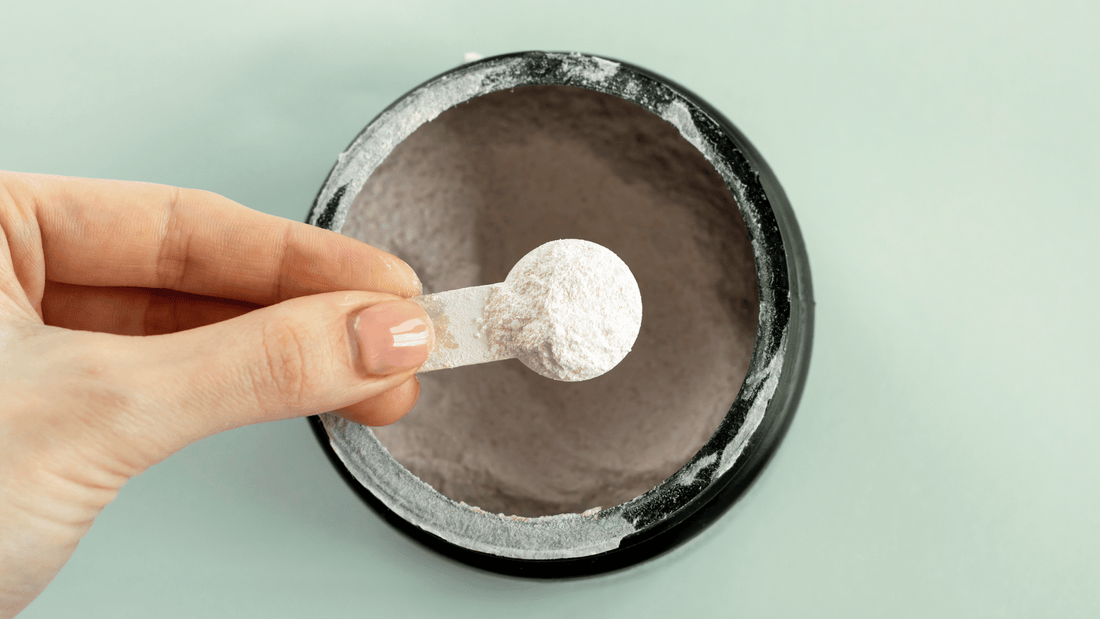
How much protein do I need?
How Much Protein Do I Need? A Friendly Guide for Women
Let’s talk about protein for everyday women who care about feeling good, being strong, staying energised, and looking after our health. Protein is one of those nutrients that quietly does it all: from helping us build and maintain muscle to keeping our hormones balanced and our energy steady throughout the day.
If you’ve ever wondered, “Am I eating enough protein?” – you’re definitely not alone. Social feeds filled with protein recipes and articles on calculating how much you need are now the norm.
Whether you’re trying for a baby, pregnant, post-baby, navigating the ups and downs of perimenopause, or simply looking to tone up or slim down – your protein needs shift over time. So, here’s a down-to-earth guide to how much you really need.
Daily Protein Requirements for Women (UK Guide)
| Age Group | Protein per Day (g)* |
|---|---|
| 19–30 years | 45–65g |
| 31–50 years | 45–65g |
| 51–70 years | 50–70g |
| 71+ years | 55–75g |
*Based on general wellness – your needs might be higher if you’re active, pregnant, or aiming for a specific health goal.
Protein Needs by Age Group
Women Aged 19–30
Ah, your twenties – whether you’re juggling studies, a job, travel or fitness goals, your body’s working hard. If you’re active, aim for around 1.2g of protein per kg of body weight.
Top tip: A scoop of protein powder in your morning smoothie makes a world of difference.
Helpful supplements: Whey or plant-based protein powder, iron (especially if you’re vegan), and a solid B-complex.
Women Aged 31–50
This is the stage where a lot of us feel like we’re spinning plates – careers, kids, life admin. Protein helps stabilise energy and supports muscle tone (hello, arms that don’t jiggle!). You still want around 1.2g per kg of body weight, maybe a little more if you’re exercising.
What I use: Collagen peptides in my coffee – it’s tasteless and great for hair, skin, joints and gut health.
Helpful supplements: Collagen, magnesium (especially if you're not sleeping well), and omega-3s.
Women Aged 51–70
This is when muscle mass starts naturally declining, so protein becomes your best ally. You can feel stronger and more energised just by increasing your intake.
Target: 1.2–1.5g per kg of body weight – and don’t forget to spread it across the day.
Helpful supplements: Leucine-enriched protein powder, vitamin D, and calcium.
Women Aged 71+
At this age, keeping strong and mobile is so important. Many women don’t realise they need more protein, not less. Even something as simple as Greek yoghurt or a protein-rich soup can make a big difference.
Helpful supplements: Whey isolate (gentler on digestion), vitamin D3, B12, and glucosamine for joints.
Protein Needs by Life Stage
Trying for a Baby
Protein helps regulate hormones and supports reproductive health. You'd be surprised how much more balanced you can feel just by making sure you have protein with each meal.
Target: 1.2g per kg of body weight.
Helpful supplements: Folate, zinc, iron, and a quality prenatal (start early!).
Pregnant
You're building a baby from scratch – it’s incredible and exhausting. Smoothies with vegan protein powder and nut butters can help if you're struggling to stomach certain foods.
Target: 1.4g per kg (second and third trimesters).
Helpful supplements: Prenatal multivitamin, omega-3s (especially DHA), iron, and choline.
Postpartum / Breastfeeding
Recovery and milk production need serious nutrients. A batch of protein muffins can be a lifesaver during cluster feeds!
Target: 1.5g per kg.
Helpful supplements: Collagen (amazing for tissue repair), magnesium, and postnatal multivitamins.
Perimenopause
The hormone rollercoaster begins! Protein helps balance blood sugar (read: fewer mood crashes) and protects against muscle loss.
Target: 1.3–1.5g per kg.
My go-to: Soy protein shakes (for phytoestrogens), plus magnesium glycinate at night for better sleep.
Helpful supplements: B6, adaptogens like ashwagandha, and vitamin D.
Menopause
Muscle mass and metabolism tend to dip during this time, so boosting protein helps maintain strength and support bone health too.
Target: 1.2–1.6g per kg.
Helpful supplements: Calcium, collagen, and protein powders with added leucine (a muscle-preserving amino acid).
Weight Loss
Protein keeps you full and helps maintain muscle while burning fat. Honestly, it can be a game-changer when you focus on protein at every meal, not just dinner.
Target: 1.6–2.2g per kg depending on activity.
Helpful supplements: Whey protein, fibre blends, green tea extract.
Muscle Building
Whether you're lifting weights or doing resistance classes, protein helps you recover and build lean muscle (which also helps with fat loss, by the way!).
Target: 1.6–2.4g per kg.
What I use: A protein shake right after a workout – sometimes with a banana or oats.
Helpful supplements: Creatine, BCAAs, whey isolate.
Best Protein Sources for Women
Here are some of protein favourites (and a few quick wins when time is short):
- Animal-based: Chicken breast, salmon, eggs, Greek yoghurt
- Plant-based: Lentils, tofu, chickpeas, quinoa, edamame
- On the go: Protein shakes, bars, collagen sachets, high-protein yoghurt (yes, even plant-based ones!)
Final Thoughts
Protein is the foundation of feeling strong, energised, and hormonally balanced – whatever stage you’re at.
A few reminders:
- Spread your protein across all meals – not just dinner!
- Pair it with healthy fats and slow carbs to keep blood sugar steady.
- Stay hydrated – your body needs water to process protein effectively.
Your body is always changing, but with the right nutrition (and a bit of kindness to yourself), you can feel supported every step of the way.
Related Articles You Might Like:
- Top 10 High-Protein Breakfast Ideas
- What to Eat During Perimenopause
- How much protein do you really need to get strong?
And as always – check with your GP, dietitian or midwife before starting new supplements, especially during pregnancy or if you have any health conditions.
